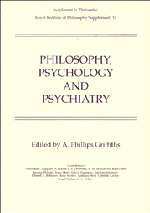Book contents
- Frontmatter
- Contents
- Preface
- Introduction: Just Getting Started
- Mind and Madness: New Directions in the Philosophy of Psychiatry
- Emotion and Memory: The Second Cognitive Revolution
- Meaning and Mechanism in Psychotherapy and General Psychiatry
- Making Sense on the Boundaries: On Moving Between Philosophy and Psychotherapy
- Mental Disorder, Illness and Biological Disfunction
- Integrity, Boundary and the Ecology of Personal Processes
- Multiple Personality and Computational Models
- Psychology and Politics: Lies, Damned Lies and Self-Deception
- Personal Identity and Psychiatric Illness
- Vices and the Self
- Wild Beasts and Idle Humours: Legal Insanity and the Finding of Fault
- Dangerousness and Mental Disorder
- Problems with the Doctrine of Consent
- Homosexuality
- Nietzsche and Music
- References
- Notes on Contributors
Introduction: Just Getting Started
Published online by Cambridge University Press: 03 May 2011
- Frontmatter
- Contents
- Preface
- Introduction: Just Getting Started
- Mind and Madness: New Directions in the Philosophy of Psychiatry
- Emotion and Memory: The Second Cognitive Revolution
- Meaning and Mechanism in Psychotherapy and General Psychiatry
- Making Sense on the Boundaries: On Moving Between Philosophy and Psychotherapy
- Mental Disorder, Illness and Biological Disfunction
- Integrity, Boundary and the Ecology of Personal Processes
- Multiple Personality and Computational Models
- Psychology and Politics: Lies, Damned Lies and Self-Deception
- Personal Identity and Psychiatric Illness
- Vices and the Self
- Wild Beasts and Idle Humours: Legal Insanity and the Finding of Fault
- Dangerousness and Mental Disorder
- Problems with the Doctrine of Consent
- Homosexuality
- Nietzsche and Music
- References
- Notes on Contributors
Summary
Ten years ago the Royal Institute of Philosophy marked the establishment of the Society for Applied Philosophy with a series of public lectures, published in an earlier book in this series, under the title Philosophy and Practice (Griffiths, 1985). Looking back it is hard to believe this was only ten years ago. Applied philosophy still has its critics. But it is now so pervasive, so much the norm, that it seems to have been with us always. Law, medicine, education, nursing, the environment, politics, economics … almost it seems, no subject is quite respectable nowadays without its philosophy and its philosophical exponents.
Psychiatry is a relative newcomer to the applied philosophy party (Fulford, p. 5, this volume). There are evident historical reasons for this: as Jeremy Holmes (p. 41) notes, psychiatry has gained respectability as a medical discipline by identifying itself with empiricism. But now that it has arrived, psychiatry brings with it a new vision of what the party is all about.
The rise of applied philosophy is generally portrayed as a reaction to the supposed aridity of the analytical philosophy of the post-war period. Preoccupied as it was with questions of meaning, philosophy appeared to have lost its connections with questions of substance. Bernard Williams (1985) captures a poignant image of the impotence of the professor's arguments when the mob breaks down the door and tramples his glasses.
- Type
- Chapter
- Information
- Philosophy, Psychology and Psychiatry , pp. 1 - 4Publisher: Cambridge University PressPrint publication year: 1995

